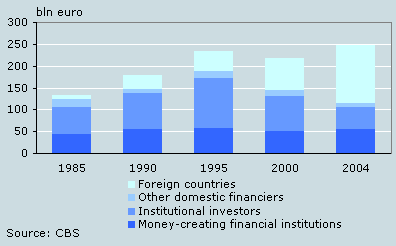Foreign countries main financiers Dutch public sector

Currently, foreign countries are the main financiers of Dutch public debt. Their share increased from 16.4 percent in 1997 to 53.5 percent in 2004.
Less prominent role for institutional investors
The role of institutional investors as providers of money to the government has been reduced in recent years. In 1997, institutional investors still financed 52.1 percent of total public debt. In 2004, their share was reduced to 20.6 percent. Foreign countries are now the most important source of financing for the public sector.
Financiers of consolidated long-term public debt

Bonds more attractive
One of the reasons for the shift is that the Dutch government managed to make government bonds more attractive to foreign parties. Another reason is the growing internationalisation of investments by institutional investors. This development set in some twenty years ago and gained momentum with the introduction of the euro, which eliminated the exchange rate risk in the entire eurozone.
Financiers of consolidated bonded debt by the government

Government averse to private loans
The role of institutional investors also became less prominent, when it comes to financing private loans. Their role was not taken over by foreign parties, but by money-creating financial institutions.
In 1991, the national government decided to switch from private loans to bonds to finance its debts. Therefore, a growing part of private loans applies to debts of regional government institutions who much more often lend money from money-creating financial institutions.
Financiers of private government loans

Bonded debt increasing part of national debt
The government’s increased preference for bonds as an efficient instrument of financing is reflected in the share of bonds in the total long-term public debt, which increased from 39 percent in 1985 to 85 percent in 2005.
Composition of consolidated long-term public debt

John Gebraad